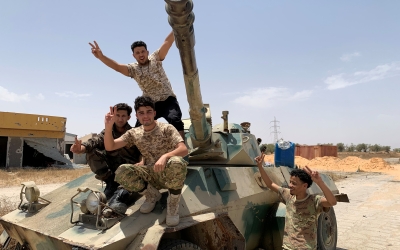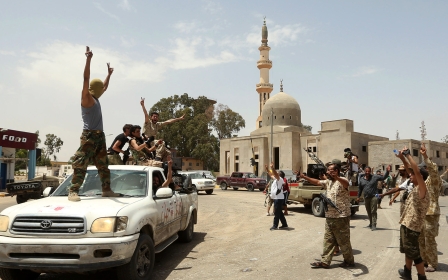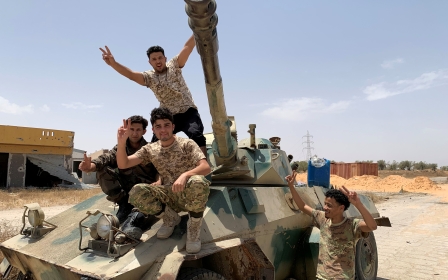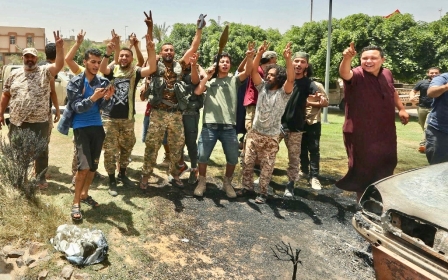Erdogan and Trump agree to form bilateral study group on Libya crisis

Turkey President Recep Tayyip Erdogan and his US counterpart Donald Trump have agreed to form a bilateral study group on Libya to discuss the crisis in the country, a Turkish offical told Middle East Eye on Tuesday.
Officials from Turkey's ministries of defence and foreign affairs, the intelligence agency MIT and other advisors will join the group, the official, who wished to remain anonymous, said.
The group is expected to coordinate Turkish and American activities in Libya and will try to successfully get a Libyan-led political process back on track under UN auspices, which failed earlier this year.
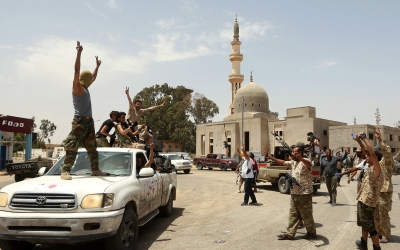
On Monday, Erdogan said that he had reached "some agreements" with Trump over Libya during telephone talks.
"A new era between Turkey and the US may start after our phone call. We agreed on some issues," Erdogan said in an interview with state broadcaster TRT, without offering specifics.
Ankara supports Libya's UN-recognised Government of National Accord (GNA) and has stepped up military support to Tripoli against eastern commander Khalifa Haftar who launched an offensive to take the capital last year.
The United States officially backs the GNA, but Haftar is supported by Washington's allies Egypt, the United Arab Emirates (UAE) and Saudi Arabia, along with Russia.
Turkey's forces, in particular its use of drones, have helped drive back Haftar from Tripoli in recent weeks with the GNA taking back full control of the city.
A White House statement said Trump and Erdogan discussed the war in the north African country, as well as Syria and the wider eastern Mediterranean region, but gave no details, Reuters reported.
Egypt had called for a ceasefire starting on Monday, as part of an initiative which also proposed an elected leadership council for Libya. Russia and the UAE also welcomed the proposal.
But Erdogan said the GNA would continue fighting to seize the coastal city of Sirte, hometown of former leader Muammar Gaddafi, and the Jufra air base further south, in a strategic region of the oil exporting country.
"Now the goal is to take over the whole Sirte area and get it done. These are areas with the oil wells, these are of great importance," he said.
'Haftar could be excluded'
Indicating the significance of Moscow in the Libyan conflict, Erdogan said he would need to also hold talks with Russian President Vladimir Putin and discuss what steps could be taken regarding Libya.
Russia has been accused of sending several thousand mercenaries from the private Russian security company Wagner Group to support Haftar, accusations the Kremlin denies.
The Turkish leader said while Moscow denied any of its soldiers were in Libya, there was Russian military hardware in the north African country including combat jets.
"They have Pantsirs [air defences] there, they sent 19 warplanes to Libya," Erdogan said. "After talking with him, we can plan ahead."
Erdogan also said "developments showed Haftar could be excluded from the peace process at any moment," AFP reported.
Libya's Prime Minister Fayez al-Sarraj, the head of the GNA, was in Ankara last week, where he said his forces were "determined" to take over the entire country from his rival Haftar.
Last month, US Secretary of State Mike Pompeo criticised the flow of weapons into Libya and urged a ceasefire during a call with Sarraj.
Libya has been mired in chaos since the 2011 overthrow of Gaddafi.
The latest phase of the conflict began after Turkey signed security and maritime agreements with Libya's GNA late last year.
Middle East Eye delivers independent and unrivalled coverage and analysis of the Middle East, North Africa and beyond. To learn more about republishing this content and the associated fees, please fill out this form. More about MEE can be found here.


